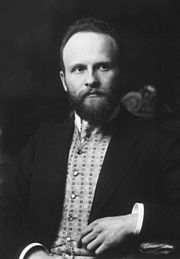Robert Bárány
Robert Bárány | |
|---|---|
 Robert Bárány | |
| Born | 22 April 1876 |
| Died | 8 April 1936 |
| Nationality | Austro-Hungarian Sweden |
| Alma mater | Vienna University |
| Awards | Nobel Prize in Physiology or Medicine (1914) |
| Scientific career | |
| Fields | Medicine |
| Institutions | Uppsala University |
Robert Bárány (22 April 1876 – 8 April 1936) was a Austrian otologist.[1][2] For his work on the physiology and pathology of the vestibular apparatus of the ear he received the 1914 Nobel Prize in Physiology or Medicine.
Bárány was born in Vienna, Austria-Hungary. He was the eldest of six children, to the former Maria Hock, the daughter of a scientist, and Ignáz Bárány, a Hungarian Jew who was a bank official and estate manager[3]
He attended medical school at Vienna University, graduating in 1900. As a doctor in Vienna, Bárány was syringing fluid into the inner ear of a patient to relieve the patient's dizzy spells. The patient experienced vertigo and nystagmus (involuntary eye movement) when Bárány injected fluid that was too cold. In response, Bárány warmed the fluid for the patient and the patient experienced nystagmus in the opposite direction. Bárány theorized that the endolymph was sinking when it was cool and rising when it was warm, and thus the direction of flow of the endolymph was providing the proprioceptive signal to the vestibular organ. He followed up on this observation with a series of experiments on what he called the caloric reaction. The research resulting from his observations made surgical treatment of vestibular organ diseases possible. Bárány also investigated other aspects of equilibrium control, including the function of the cerebellum.
He served with the Austrian army during World War I as a civilian surgeon and was captured by the Russian Army. When his Nobel Prize was awarded in 1914, Bárány was in a Russian prisoner of war camp. He was released in 1916 following diplomatic negotiations with Russia conducted by Prince Carl of Sweden and the Red Cross. He was then able to attend the Nobel Prize awards ceremony in 1916, where he was awarded his prize. From 1917 until his death he was professor at Uppsala University.
He died shortly before his sixtieth birthday at Uppsala.
See also
- Bárány chair
- List of Austrian scientists
- Famous Austrians
- Famous Hungarians
- Spatial disorientation
- Instrument flight
- Instrument rating
References
- ^ Robert Bárány. (2009). In Encyclopædia Britannica. Retrieved June 06, 2009, from Encyclopædia Britannica Online: http://www.britannica.com/EBchecked/topic/52622/Robert-Barany
- ^ http://books.google.com/books?id=DGxdVKRBgpUC&pg=PA37&dq=%22Robert+B%C3%A1r%C3%A1ny%22+austrian&hl=en&ei=rS1lTPfmG9KZ4AaJjYmHCw&sa=X&oi=book_result&ct=result&resnum=2&ved=0CCwQ6AEwAQ#v=onepage&q=%22Robert%20B%C3%A1r%C3%A1ny%22%20austrian&f=false
- ^ http://books.google.com/books?ei=HC5lTIKiI6aG4ga7mPGVCg&ct=result&id=hpQYAAAAIAAJ&dq=%22Robert+B%C3%A1r%C3%A1ny%22+hungarian&q=%22+hungarian+jew%22#search_anchor
Sources
- Nobel Lectures, Physiology or Medicine 1901-1921, Elsevier Publishing Company, Amsterdam, 1967.
External links
- Robert Bárány – Biography at Nobelprize.org
- 1876 births
- 1936 deaths
- People from Vienna
- Austrian neuroscientists
- Austrian physicians
- History of neuroscience
- Hungarian Nobel laureates
- Austro-Hungarian Nobel laureates
- Hungarian-Austrian Jews
- Immigrants to Sweden
- Swedish people of Hungarian descent
- Swedish Jews
- Swedish physicians
- Nobel laureates in Physiology or Medicine
- Uppsala University faculty
